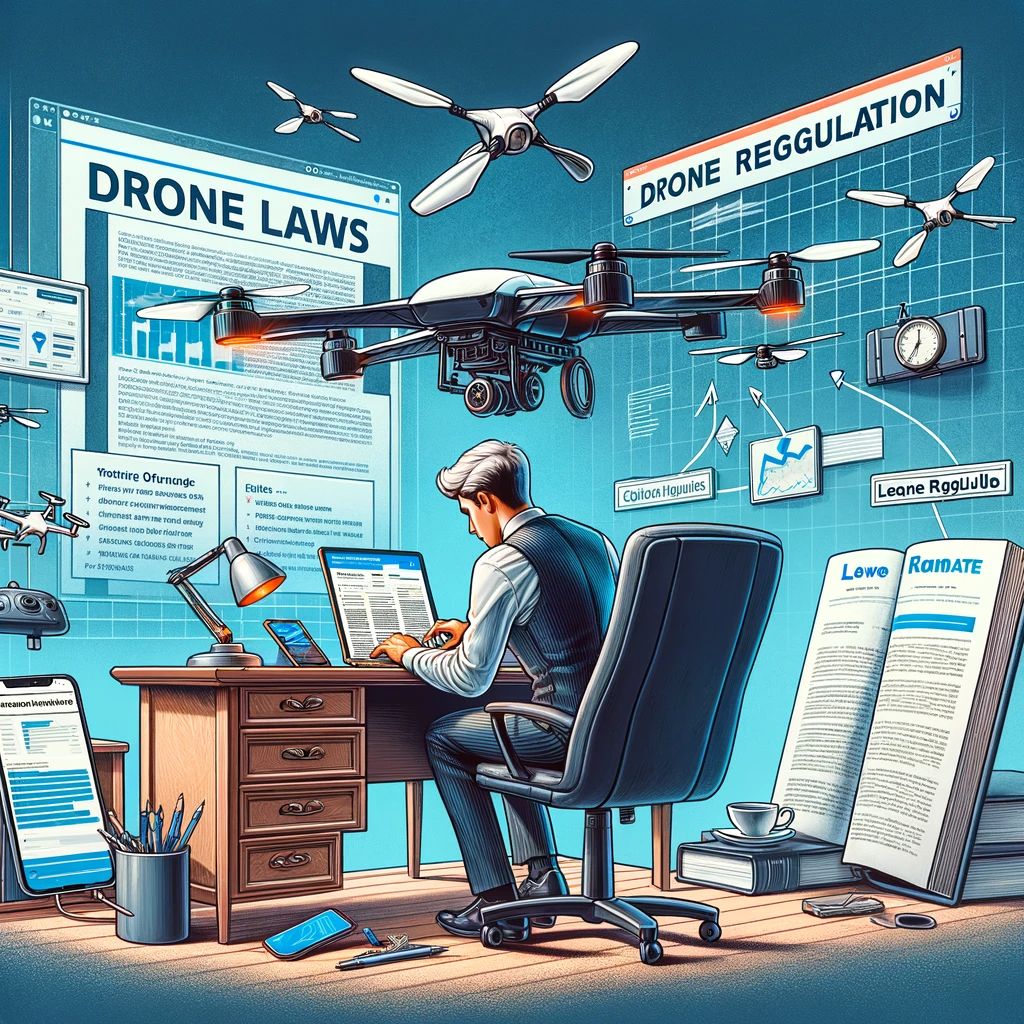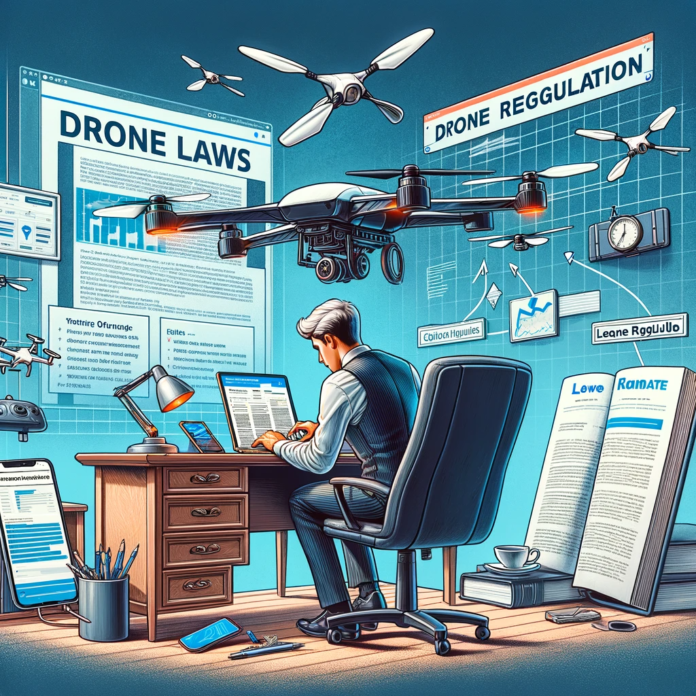
Are you a drone enthusiast who wants to stay on top of the ever-changing drone laws? In a world where regulations are constantly evolving, it’s crucial to keep yourself updated to ensure legal and safe flying. This article will guide you on how to stay informed about the current drone laws, providing you with valuable tips and resources to navigate the intricate web of regulations. From official government sources to online communities, the options are varied and abundant, enabling you to stay in the know and enjoy your drone hobby responsibly.
Understanding the Importance of Staying Updated on Drone Laws
If you own or operate a drone, it’s crucial to stay updated on the latest drone laws in your area. Drone regulations are constantly evolving as technology advances and authorities strive to maintain safety and privacy. By staying informed, you can ensure that you are flying your drone legally and responsibly. In this article, we will explore the importance of understanding drone laws at the national, state/provincial, local, and industry-specific levels, as well as how to monitor changes in these laws.
National Drone Laws
At the national level, different countries have their own regulatory bodies and laws governing drones. It’s essential to familiarize yourself with these laws to avoid violations and potential penalties. Let’s take a look at some prominent national drone laws and the regulatory bodies responsible for enforcing them.
Federal Aviation Administration (FAA) Regulations
If you are in the United States, the Federal Aviation Administration (FAA) is responsible for regulating drones. The FAA has established rules for both recreational and commercial drone operations. Whether you are flying for fun or commercial purposes, it’s important to follow the FAA guidelines to ensure safety and compliance.
Transport Canada Regulations
In Canada, Transport Canada oversees drone regulations. This regulatory body enforces rules to ensure the safe and responsible operation of drones. Canadian drone laws aim to protect airspace users, people on the ground, and the privacy of individuals.
Civil Aviation Authority (CAA) Regulations
The United Kingdom’s Civil Aviation Authority (CAA) is in charge of regulating drones. Their regulations are designed to ensure the safety of others, protect privacy, and prevent a negative impact on manned aircraft operations. Adhering to CAA regulations is crucial for drone operators in the UK.
State/Provincial Drone Laws
While national laws provide a foundation for drone regulations, individual states and provinces often have their own laws to address specific local concerns. It’s important to understand the role of these state/provincial laws and how they may impact your drone operations.
Understanding the Role of State/Provincial Laws
State and provincial laws supplement national regulations to address local issues such as airspace restrictions, flight limitations, and privacy concerns. These laws could vary from one jurisdiction to another, so it is crucial to be aware of the specific regulations that apply to your location.
Examples of State/Provincial Drone Laws
To illustrate the significance of state/provincial laws, let’s consider a few examples. In the United States, California prohibits flying drones over schools during school hours to protect the privacy and safety of students. Similarly, in Australia, New South Wales enforces regulations that restrict drones from flying within 30 meters of people not associated with the drone operation. These examples demonstrate how state/provincial laws adapt to local circumstances and should not be overlooked.
Local Drone Laws
In addition to national and state/provincial laws, you must also be aware of local drone regulations set by municipalities and cities. These laws are intended to address specific concerns within smaller geographic areas and are equally important to follow.
Municipal and City Drone Regulations
Municipalities and cities create drone regulations to address unique challenges related to local infrastructure, public spaces, and community welfare. For example, a city may ban drones from flying near hospitals to avoid interference with medical equipment. By understanding and following these regulations, you can avoid legal issues and help maintain a positive relationship with your local community.
How to Find Local Drone Laws
Finding local drone laws can be challenging, but there are resources available to help you navigate these regulations. Start by checking your local government’s website or reaching out to the city or municipal authorities directly. Often, they will have information on drone regulations and may provide guidance on who to contact for further clarification.
Complying with Local Drone Laws
Once you have identified the local drone laws that apply to you, it’s crucial to comply with them. This means understanding any restrictions on flight altitudes, no-fly zones, and permissible operating hours. By adhering to these regulations, you are contributing to the safe integration of drones into your local community.
Industry-Specific Drone Laws
Whether you fly drones for commercial purposes or as a recreational hobbyist, there are industry-specific laws and regulations that you need to be aware of.
Special Regulations for Commercial Drone Operations
Commercial drone operators are subject to additional regulations to ensure the safety of the public and maintain professional standards. These regulations may include obtaining appropriate licenses and certifications, adhering to flight restrictions, and complying with specific operating guidelines. It is essential to understand and follow these regulations to conduct commercial drone operations legally.
Rules for Recreational and Hobbyist Drone Users
Even if you fly drones purely for recreational purposes, you are still bound by certain rules and guidelines. These rules typically include restrictions on flying near airports, keeping drones within line of sight, and not interfering with manned aircraft. By understanding and respecting these regulations, you can enjoy your drone hobby while minimizing potential risks.
Changes in Drone Laws
Drone laws are not static; they undergo changes and updates as authorities address emerging issues and technological advancements. It’s important to stay informed about these changes to maintain compliance with the most current regulations.
Reasons for Changes in Drone Laws
Changes in drone laws may arise for various reasons. Technological advancements in drones can lead to the need for updated regulations to address new capabilities and potential risks. Incidents involving drones, such as unauthorized flights in restricted airspace or privacy violations, can also prompt authorities to revise existing laws.
Monitoring Regulatory Updates
To stay updated on changes in drone laws, it is advisable to monitor official government websites and resources. These platforms often provide the most up-to-date information on regulations, guidelines, and any forthcoming changes. Let’s explore some key resources for staying informed.
Government Websites and Resources
Government agencies responsible for drone regulations often maintain dedicated websites and resources to keep drone operators informed about the latest rules and developments.
FAA DroneZone
In the United States, the FAA’s DroneZone website is a valuable resource for drone operators. It provides information on registration, flying guidelines, airspace requirements, and educational materials to promote safe and responsible drone use.
Transport Canada – Drone Safety
Transport Canada’s Drone Safety website is a comprehensive resource for Canadian drone operators. It offers guidance on regulations, pilot certification, flight conditions, and other essential information for safe and legal drone operations in Canada.
CAA – Drones and Model Aircraft
For drone operators in the United Kingdom, the Civil Aviation Authority’s (CAA) dedicated “Drones and Model Aircraft” webpage serves as a go-to resource. It contains information on laws, operational restrictions, and safety guidelines specific to the UK.
Drone Associations and Organizations
Drone associations and organizations play a vital role in promoting responsible drone use and advocating for drone operators’ interests. They often provide valuable resources, educational materials, and updates on drone laws. Here are a few notable associations and organizations:
National Association of Realtors (NAR)
The National Association of Realtors (NAR) in the United States offers resources and guidance to real estate professionals who utilize drones for aerial photography and videography. They often provide updates on relevant laws and regulations affecting the real estate industry.
Academy of Model Aeronautics (AMA)
The Academy of Model Aeronautics (AMA) is a leading organization in the United States that represents and supports recreational drone and model aircraft enthusiasts. They provide educational materials, safety guidelines, and information on regulatory developments impacting hobbyist drone use.
Association for Unmanned Vehicle Systems International (AUVSI)
The Association for Unmanned Vehicle Systems International (AUVSI) is a global organization dedicated to advancing the unmanned systems and robotics industry. They offer resources, networking opportunities, and updates on regulatory changes impacting commercial drone operations.
Legal Resources and Blogs
In addition to official government resources and industry associations, several legal resources and blogs focus on drones’ legal aspects, providing insights into current and emerging regulations.
Drone Law Journal
The Drone Law Journal is a comprehensive online resource covering legal topics related to drones. It publishes articles, analysis, and case studies that help drone operators stay informed about the latest legal developments.
The Drone Girl
The Drone Girl is a widely recognized blog that covers a broad range of drone-related topics, including regulations, news, and technological advancements. It offers valuable insights to help drone operators understand and comply with drone laws.
Drone Lawyer Blog
The Drone Lawyer Blog features articles and updates on drone laws, licensing requirements, and legal issues surrounding drone operations. It serves as a valuable resource for legal information specific to drones.
Social Media and Online Communities
Social media platforms and online communities can be another useful source of information and a way to connect with other drone enthusiasts and professionals. Here are some popular platforms and online communities to consider:
Facebook Groups
Facebook hosts numerous drone-related groups where members share information, discuss regulations, and help each other navigate the ever-changing landscape of drone laws. Joining these groups can provide you with valuable insights and a sense of community.
Subreddits
Reddit features several subreddits dedicated to drones, such as r/drones and r/fpv. These communities offer a platform for discussions, sharing experiences, and staying updated on drone laws and regulations.
Drone Discussion Forums
Various online drone discussion forums, such as DJI Forum and Dronepilots.com, provide spaces for drone enthusiasts to ask questions, seek advice, and exchange information. These forums often have dedicated sections for discussing drone laws and regulations.
By actively participating in these online communities, you can stay up to date on current discussions, learn from others’ experiences, and ensure you are aware of any recent changes or developments in drone regulations.
In conclusion, staying updated on drone laws is essential for every drone operator. By understanding national, state/provincial, local, and industry-specific regulations, monitoring changes, and utilizing resources like government websites, associations, legal blogs, and online communities, you can navigate the ever-evolving drone regulatory landscape confidently. Remember, complying with drone laws not only keeps you on the right side of the law but also contributes to the safe and responsible integration of drones into our airspace. Happy flying!

